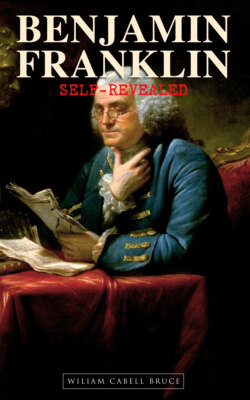Читать книгу Benjamin Franklin, Self-Revealed - Wiliam Cabell Bruce - Страница 17
На сайте Литреса книга снята с продажи.
FOOTNOTES:
Оглавление[9] In his Plan for Settling Two Western Colonies in North America, Franklin says ruefully that, if the English did not flow westwardly into the great country back of the Appalachian Mountains on both sides of the Ohio, and between that river and the Lakes, which would undoubtedly (perhaps in less than another century) become a populous and powerful dominion, and a great accession of power either to England or France, the French, with the aid of the Indians, would, by cutting off new means of subsistence, discourage marriages among the English, and keep them from increasing; thus (if the expression might be allowed) killing thousands of their children before they were born.
[10] The existence of so much evil and misery in the world was a stumbling-block to Franklin as it has been to so many other human beings. In a letter to Jane Mecom, dated Dec. 30, 1770, he told her that he had known in London some forty-five years before a printer's widow, named Ilive, who had required her son by her will to deliver publicly in Salter's Hall a solemn discourse in support of the proposition that this world is the true Hell, or place of punishment for the spirits who have transgressed in a better place and are sent here to suffer for their sins as animals of all sorts. "In fact," Franklin continued, "we see here, that every lower animal has its enemy, with proper inclinations, faculties, and weapons, to terrify, wound, and destroy it; and that men, who are uppermost, are devils to one another; so that, on the established doctrine of the goodness and justice of the great Creator, this apparent state of general and systematical mischief seemed to demand some such supposition as Mrs. Ilive's, to account for it consistently with the honour of the Deity."
[11] The American Philosophical Society Held at Philadelphia for Promoting Useful Knowledge was formed in 1769 by the union of the Philosophical Society founded by Franklin, which, after languishing for many years, was revived in 1767, and The American Society Held at Philadelphia for the Promotion of Useful Knowledge; and Franklin, though absent in England, was elected its first President.
[12] As a token of his sense of obligation to the instruction derived by him in his boyhood from a free Boston grammar school, Franklin bequeathed the sum of one hundred pounds sterling to the free schools of that city, subject to the condition that it was to be invested, and that the interest produced by it was to be annually laid out in silver medals, to be awarded as prizes.
[13] In an earlier letter to James Parker, Franklin commented on the "Dutch" immigration into Pennsylvania very much as a Californian was afterwards in the habit of doing on the Chinese immigration to our Pacific coast. The "Dutch" under-lived, and were thereby enabled, he said, "to under-work and under-sell the English." In his essay on The Increase of Mankind, he asked: "Why should the Palatine Boors be suffered to swarm into our Settlements, and, by herding together, establish their Language and Manners, to the Exclusion of ours?" Expressions in his letter to Jackson, which we do not mention in our text, make it manifest enough that he gravely doubted whether the German population of Pennsylvania could be relied upon to assist actively in the defence of the Province in the event of its being invaded by the French. However, after suggesting some means of improving the situation, he is compelled to conclude with these words: "I say, I am not against the Admission of Germans in general, for they have their Virtues. Their Industry and Frugality are exemplary. They are excellent Husbandmen; and contribute greatly to the Improvement of a Country."
[14] Another sidelight upon the character of Franklin in his boyhood is found in connection with the caution in regard to England that he gave to Robert Morris in 1782, when the Revolutionary War was coming to an end. "That nation," he said, "is changeable. And though somewhat humbled at present, a little success may make them as insolent as ever. I remember that, when I was a boxing boy, it was allowed, even after an adversary said he had enough, to give him a rising blow. Let ours be a douser."
[15] Franklin certainly set an example on this occasion of the vigilant regard to the future which he afterwards enjoined in such a picturesque way upon Temple, when he was counselling the latter not to let the season of youth slip by him unimproved by diligence in his studies. "The Ancients," he said, "painted Opportunity as an old Man with Wings to his Feet & Shoulders, a great Lock of Hair on the forepart of his Head, but bald behind; whence comes our old saying, Take Time by the Forelock; as much as to say, when it is past, there is no means of pulling it back again; as there is no Lock behind to take hold of for that purpose." The advice of similar tenor in a somewhat later letter from Franklin to Temple has a touch of poetry about it. "If this Season is neglected," he said, "it will be like cutting off the Spring from the Year." So quick was the sympathy of Franklin always with youthful feelings and interests that he never grew too old for the application to him of Emerson's highly imaginative lines,
"The old wine darkling in the cask,
Feels the bloom on the living vine."
